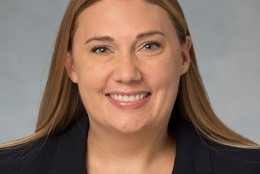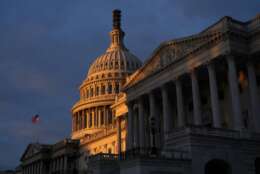Pay
-
There likely won't be a cost of living adjustment for federal retirees and people who get Social Security. Senior Correspondent Mike Causey explains why.
October 15, 2015 -
Catch up on the most buzzworthy federal stories of recent days and join the conversation in this new regular feature. Think of it as your cheat sheet to Federal News Radio.
October 12, 2015 -
The more you try to compare federal and private salaries and benefits, the more complicated the topic becomes.
October 12, 2015 -
Low inflation makes a cost-of-living adjustment for federal retirees unlikely next year. If that happens it could make almost a million former federal employees a little poorer. Jessica Klement, legislative director for the National Active and Retired Federal Employees association, told In Depth with Francis Rose why Civil Service Retirement System retirees might see an income drop next year
October 12, 2015 -
Federal workers are 1 percentage point happier this year than they were in 2014. Senior Correspondent Mike Causey says this is a giant leap for mankind, sort of.
October 09, 2015 -
Cato says the average salary and benefits of the federal workforce, which consists of 2.1 million people, are 78 percent higher than the average salary of 111 million people in the private sector.
October 07, 2015 -
Sen. Richard Blumenthal (D-Conn.) wrote a letter to the Justice Department pushing for action on this latest scandal at the Veterans Affairs Department.
October 06, 2015 -
The outlook for federal workers and retirees when it comes to income in 2016 is pretty grim, says Senior Correspondent Mike Causey.
October 06, 2015 -
The defense authorization bill agreed upon by House and Senate negotiators would affect military pocketbooks in ways both big and small. It includes a 1.3 percent pay increase for uniformed service members but chips away at the military's pension system. In exchange for shrinking pensions, it encourages current troops — and mandates that future ones — invest in the Thrift Savings Plan.
September 30, 2015 -
Reps. Don Beyer (D-Va.) and Rob Wittman (R-VA) introduced the Federal Employee Retroactive Pay Fairness Act, which would secure retroactive pay for all federal employees during a government shutdown, regardless of furlough status.
September 29, 2015 -
Greg Stanford and Katie Maddocks of the Federal Managers Association and benefits expert Tammy Flanagan join host Mike Causey to discuss a pending pay raise for federal workers and retirees, the new self-plus one health care option and the possibility of a government shutdown. September 30, 2015
September 29, 2015 -
Being a federal worker is a lot like being a fat, juicy rabbit trapped on a fox-infested island. That's because to some foxy politicians, civil servants are fat, juicy, defenseless targets. Some are on the hunt all the time, while others come out in the fall — the official hunting season.
September 28, 2015 -
AFGE reminds Congress, White House and others of the concerns feds had during the last government shutdown and the impact the work stoppage had on them and their families in 2013.
September 18, 2015 -
Thanks to a new executive order, 300,000 employees of federal contractors have a new benefit coming and their employers have a new mandate to comply with. On Labor Day, President Barack Obama signed an executive order requiring their employers to offer paid sick leave. Eric Crusius, who represents government contractors at the law firm Miles & Stockbridge, offered his take on In Depth with Francis Rose as part of Industry Chatter.
September 10, 2015 -
A new "We the People" petition posted on WhiteHouse.gov calls for President Obama to give federal employees "a meaningful pay raise" this year. It was first posted on Aug. 31, a few days after President Barack Obama proposed an across-the-board, 1 percent pay raise for civilian federal employees and a 1.3 percent raise for members of the military in 2016. The petition needs 100,000 signatures for the White House to respond.
September 02, 2015






